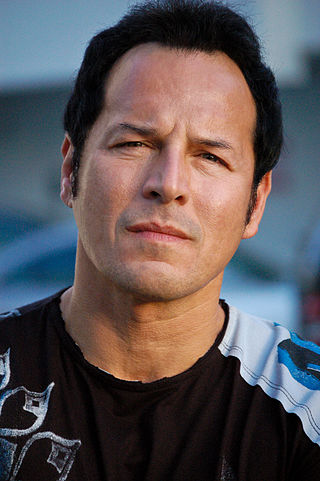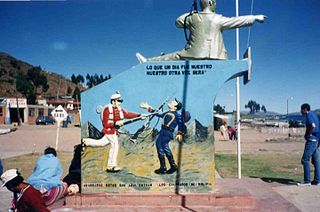Related Research Articles

Uruguay, officially the Oriental Republic of Uruguay, is a country in South America. It shares borders with Argentina to its west and southwest and Brazil to its north and northeast, while bordering the Río de la Plata to the south and the Atlantic ocean to the southeast. It is part of the Southern Cone region of South America. Uruguay covers an area of approximately 176,215 square kilometres (68,037 sq mi) and has a population of around 3.4 million, of whom nearly 2 million live in the metropolitan area of its capital and largest city, Montevideo.

Buenos Aires, officially the Autonomous City of Buenos Aires, is the capital and primate city of Argentina. The city is located on the western shore of the Río de la Plata, on South America's southeastern coast. "Buenos Aires" is Spanish for "fair winds" or "good airs". Buenos Aires is classified as an Alpha global city, according to the Globalization and World Cities Research Network (GaWC) 2020 ranking.

The culture of Argentina is as varied as the country geography and is composed of a mix of ethnic groups. Modern Argentine culture has been influenced largely by the Spanish colonial period and the 19th/20th century European immigration, and also by Amerindian culture, particularly in the fields of music and art. Buenos Aires, its cultural capital, is largely characterized by both the prevalence of people of Southern European descent, and of European styles in architecture. Museums, cinemas, and galleries are abundant in all of the large urban centers, as well as traditional establishments such as literary bars, or bars offering live music of a variety of music genres.
Straight Plan for the Gay Man is an American comedy television series that premiered on February 23, 2004, on Comedy Central. It is a parody of Bravo's hit Queer Eye for the Straight Guy. Four straight comedians – Curtis Gwinn, Billy Merritt, Kyle Grooms, and Rob Riggle – make over three gay men to pass as straight. The show only ran for three episodes. Music composed by Bob Golden.
The Argentina men's national basketball team represents Argentina in men's international basketball officially nicknamed The Argentine Soul, and it is controlled by the Argentine Basketball Federation.

Argentina has a racially and ethnically diverse population. The territory of what today is Argentina was first inhabited by numerous indigenous peoples. The first white settlers came during the period of Spanish colonization, beginning in the 16th century. The Spaniards imported African slaves, who would go on to become the first Afro-Argentines. Following independence from Spain in the 19th century and well into the 20th century, numerous migration waves took place, with Argentina being the second most popular destination for migrants in the early 20th century, after the United States. Most of these migrants came from Europe.

Spanish settlement in Argentina, that is the arrival of Spanish emigrants in Argentina, took place first in the period before Argentina's independence from Spain, and again in large numbers during the late 19th and early 20th centuries. Between the 15th and 19th centuries, the Spanish Empire was the sole colonial power in the territories that became Argentina after the 1816 Argentine declaration of independence. Thus, before 1850, the vast majority of European settlers in Argentina were from Spain and they carried the Spanish colonial administration, including religious affairs, government, and commercial business. A substantial Spanish descended Criollo population gradually built up in the new cities, while some mixed with the indigenous populations (Mestizos), with the Black African-descended slave population (Mulattoes) or with other European immigrants.

Down Argentine Way is a 1940 American musical film made in Technicolor by Twentieth Century Fox. It made a star of Betty Grable in her first leading role for the studio although she had already appeared in 31 films, and it introduced American audiences to Carmen Miranda. It also starred Don Ameche, The Nicholas Brothers, Charlotte Greenwood, and J. Carrol Naish.

Television is one of the major mass media of Argentina. As of 2019, household ownership of television sets in the country is 99%, with the majority of households usually having two sets. Cable television has become the most used type of delivering, with 73.2% of households having a cable provider.

Héctor Echavarría is an Argentine actor, producer, filmmaker, martial artist, activist, businessman and screenwriter.

Argentina has 35 indigenous people groups officially recognized by the national government. As of the 2010 census [INDEC], some 955,032 Argentines self-identify as indigenous or first-generation descendants of indigenous peoples.

Argentina, officially the Argentine Republic, is a country in the southern half of South America. Argentina covers an area of 2,780,400 km2 (1,073,500 sq mi), making it the second-largest country in South America after Brazil, the fourth-largest country in the Americas, and the eighth-largest country in the world. It shares the bulk of the Southern Cone with Chile to the west, and is also bordered by Bolivia and Paraguay to the north, Brazil to the northeast, Uruguay and the South Atlantic Ocean to the east, and the Drake Passage to the south. Argentina is a federal state subdivided into twenty-three provinces, and one autonomous city, which is the federal capital and largest city of the nation, Buenos Aires. The provinces and the capital have their own constitutions, but exist under a federal system. Argentina claims sovereignty over the Falkland Islands, South Georgia and the South Sandwich Islands, the Southern Patagonian Ice Field, and a part of Antarctica.

Anti-Chilean sentiment or chilenophobia refers to the historical and current resentment towards Chile, Chileans, or Chilean culture. Anti-Chilean sentiment is most prevalent among Chile's neighbors Argentina, Bolivia and Peru.

International relations between Argentina and Israel, have existed for decades. Both countries established diplomatic relations on 31 May 1949.

Argentine nationalism is the nationalism of Argentine people and Argentine culture. It surged during the War of Independence and the Civil Wars, and strengthened during the 1880s.

RT en Español, also known as Actualidad RT, is a Spanish-language pay television channel that is part of the RT network. Launched in 2009, it is based in Moscow, and has bureaus in Miami, Los Angeles, Madrid, Managua, Caracas, Havana and Buenos Aires.

Tourism in Panama represents one of Panama‘s main activities. The main areas of tourism in the country focus on business tourism, beaches, health and trade. Most of the tourists come from the United States, Canada, Europe, Central America, and South America. Tourism generates profits of approximately US$1,400 million annually. This figure has increased rapidly since the millionth tourist arrived in 2004. There were 2 million tourists in 2011.

Argentina competed in the 2019 Pan American Games in Lima, Peru from July 26 to August 11, 2019.

The COVID-19 pandemic in Argentina is part of the worldwide pandemic of coronavirus disease 2019 caused by severe acute respiratory syndrome coronavirus 2. As of 11 April 2024, a total of 10,128,845 people were confirmed to have been infected, and 130,841 people were known to have died because of the virus.
References
- ↑ Sims, Calvin (May 24, 1998). "The World; Formerly Arrogant, Utterly Argentine" – via NYTimes.com.
- ↑ Romero, Simon; Gilbert, Jonathan (June 10, 2014). "Why So Many World Cup Fans Dislike Argentina" – via NYTimes.com.
- ↑ "Cómo ven a los argentinos los extranjeros que viven en el país". www.clarin.com. 21 July 2002.